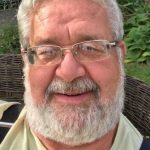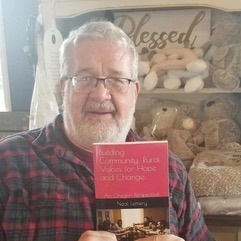
by Neal Lemery
We took a long weekend, embarking on a road trip across the Northwest for a birthday, a long over-due gathering of loved ones, dear friends, to celebrate a milestone, to simply have fun together. We also needed to get away, and enjoy the colors of fall, and have an adventure. It was time for new perspectives.
Traveling on unfamiliar roads and through unfamiliar towns and cities, we came across a number of traffic circles. Roundabouts challenge me and I have to concentrate on my destination and the next link in the day’s travels, in order to escape the circle and go on my way. A traffic circle doesn’t let me easily stop and contemplate my next move. I’m compelled to join the fray, find the correct lane and get out at the right time. It is not unusual for me to stay in the circle for a complete circle or even two, until I figure out my path of escape. Like the rest of life, it often seems to be more chaos than order.
Yet, it is efficient. Once I figure out the methodology of it all, and know my destination, I do just fine.
Gatherings with friends and loved ones often challenge me in the same way. I tend to stand back and watch. I pick up on the examples of old, often expected behaviors, and the old ghosts of dysfunction and family dramas from past generations, the stuff that continues to be toxic for the newest generations. We can learn and change, but sometimes, we seem to be stuck on the dysfunctional roundabout and don’t know how to get off, how to leave the circle. We often repeat the toxicity of the past, and don’t manage to move on.
This weekend, I had some deep conversations with two members of the generation behind me, men I’ve often encouraged and counseled, as they’ve struggled in their lives, often plagued by their wounds and addictions. Alcohol is their poison of choice, how they self-medicate to try to kill their pain of rejections, abandonments, and challenges with self-esteem and appreciation for deep down goodness and compassion. They are good men, and when you scrape away the drunkenness and self-anger, they are loving and compassionate.
I haven’t talked with them in a state of sobriety for at least the last twenty years. I struggle with making the effort, with sitting down with them, and going deep about the meaning of life, of self-respect. Being the good role model, the wise elder is a challenging role for me to play as they pound down the first dozen of their day’s beers.
Still, I make the effort, I have the conversations, and I try to keep the gate open with them to build our relationship. I strive to be the good bridge keeper, a healer of some of our more challenging issues. I keep hoping the day will soon come when they reach out to me, telling me they want to get sober, and invite me into that work. I keep hoping to find my magic wand, yet I know that true sobriety, true insight begins when they, and not me, decide it is time for change.
Until then, our relationship is stuck in a roundabout, circling around the hard conversations, the long histories of trauma, abuse, neglect, and chaos, the stuff that one tries so desperately to ignore, the challenges you try to drown with your beer. We circle, we change lanes sometimes, but we’re often stuck and don’t seem to know how to break that circle, and move on with our lives and our relationships.
Each of us can break our generational curses — our guilt and shame. We can begin our own traditions, expectations of friendship and be free.
I want to think that I really do have a magic wand. It isn’t covered with fairy dust, and it doesn’t instantly solve worries and problems that have festered for generations. My magic wand involves time and patience, and unconditional love. It involves a belief that people truly can change, that each of us can dig deep and learn about ourselves and our wounds, that we have the tools in hand to take on and deal with a lifetime of worries and stress. We can change, each of us. Change and the rest of our lives can begin with one step in the right direction, and having the support of someone who loves us, who can hold our hand, and who believes that we are worthy of that effort to move ahead.
My job in all this is to be the good friend, the patient one, offering myself as an example of a different path, and to offer my unconditional love and compassion to them. I’m old enough to know that preaching and condemning builds even higher walls, and doesn’t provide the answers that will come, eventually. I need to wait, and I keep extending my hand in friendship and love, trying to be that friend that is always there, always caring, and always representing the alternative path, the way out of the seemingly endless circles of addiction and self-destruction.
Perhaps this visit, and these conversations, have pushed open some doors, making the path to sobriety and insight just a little more easy to find. Perhaps they have heard and felt my love for them, and that life offers some choices. There is a way out of the real traffic circles of our lives.

Books: NEW book – Building Community: Rural Voices for Hope and Change; Finding My Muse on Main Street, Homegrown Tomatoes, and Mentoring Boys to Men


.png)